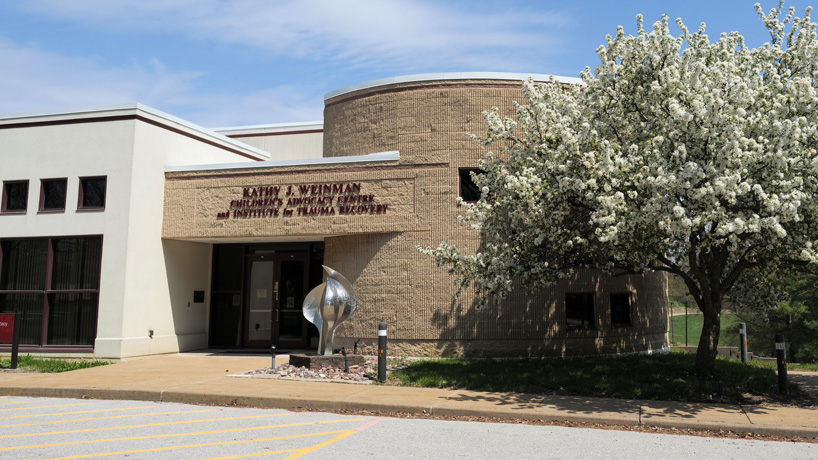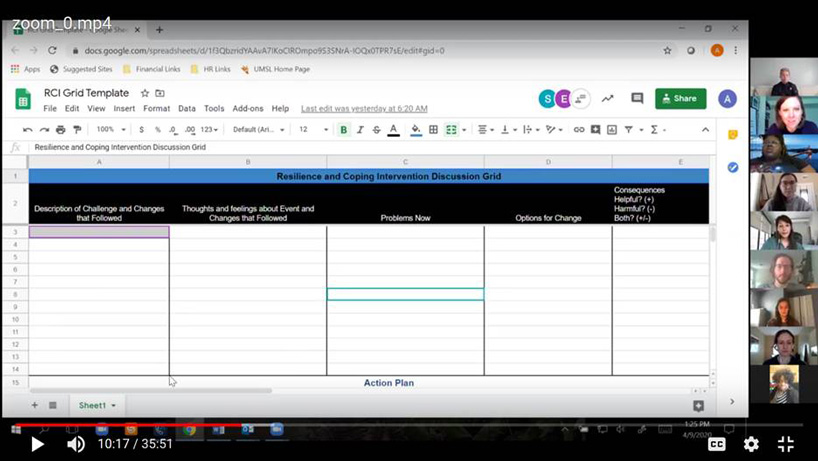
Children’s Advocacy Services of Greater St. Louis has trained more than 500 community members to use Resiliency and Coping Intervention to help the youth they serve deal with stressors in their everyday lives since 2014. (Photo by August Jennewein)
Americans were still coming to grips with the death toll from COVID-19 rising to more than 100,000 and unemployment surging to its highest levels since the Great Depression when the death of George Floyd while in police custody in Minneapolis reopened the wounds of racism and set off nationwide protests of police brutality.
The St. Louis region has not been immune to the ensuing turmoil with a few of the protests of Floyd’s death turning violent.
Last weekend in Ferguson, police used tear gas to try to control a crowd as protesters shot fireworks at officers, smashed windows at the police department and looted a beauty supply store. Those scenes recalled the unrest that pushed the north St. Louis County suburb into the national spotlight following the death of Michael Brown in 2014.
Mental health professionals worry about the damage all of this trauma is inflicting on members of the community, including children.
“We’ve got a situation where we have the nexus of a global pandemic that is taking a disproportionate toll on families of color in first place, and then you have situations that really just bring to the forefront institutional racism and historical trauma,” said Jerry Dunn, a clinical professor of psychological sciences at the University of Missouri–St. Louis and the executive director of Children’s Advocacy Services of Greater St. Louis. “It’s really difficult for our families to cope right now.”
It is going to take actions from people throughout society to solve the systemic issues that lead to inequality in health care, education and economic opportunity and too often leave people of color on the frontlines to experience violence.
As staff members at CASGSL wait and hope for change to occur, they are also doing what they can to build resilience among children and adolescents in disadvantaged communities through individual and group counseling as well as forensic interviews.
“Our staff at CASGSL is very well prepared to address any of those traumatic events that would impact children and families,” Dunn said. “But we recognize that we are one team, and we need to help our community build capacity also.”
That means teaching community members how they can help their community heal. Not long after Brown’s death in 2014, the Missouri Academy for Child Trauma Studies – the training division of CASGSL – began coordinating efforts to train staff as trainers in several crisis intervention models, including Psychological First Aid, Skills for Psychological Recovery and Resiliency and Coping Intervention.
RCI has proved particularly useful, not only in the wake of the unrest in Ferguson but in the years since, including around the first anniversary of Brown’s death, following the verdict in the Jason Stockley case in 2017 and most recently amid the COVID-19 pandemic.
It was first developed in the wake of the Oklahoma City bombing and also used in New Orleans after Hurricane Katrina to help community members cope with the trauma from those events.
Missouri Academy for Trauma Studies staff members adapted the Resiliency and Coping Intervention training to a virtual format last month so they could prepare community members to support children and adolescents trying to cope with stressors that accompanied the COVID-19 pandemic. (Screenshot courtesy of Amy Escott)
RCI is a group intervention designed for use with children and adolescents to help them identify thoughts, feelings, and coping strategies related to issues that accompany a disaster, traumatic event or other problematic experience.
Groups of between five and 10 people gather to talk through issues in a single 45-minute session and have the ability to follow-up in additional sessions.
“It’s a very elegant model,” said Amy Escott, the project director at MoACTS. “The way the group works is that each session the group members decide what is the shared stressful experience that we all have going on that we want to talk about today. One week, it might be the protests. Another week it might be coronavirus.
“It allows the facilitator to work with the participants and figure out what’s the best option.”
The relaxation and coping skills it provides can help children and adolescents regardless of the circumstances creating those stressors.
Brian Houston, an associate professor in the Department of Communication at the University of Missouri–Columbia and co-director of its Disaster and Community Crisis Center, has done extensive research on the intervention, and he helped CASGSL with their initial efforts.
Houston and his team paid a visit to St. Louis on short notice in 2014 to teach CASGSL staff members to train others in the community, including school counselors and social workers in both the Ferguson-Florissant School District and St. Louis Public Schools.
CASGSL staff members have conducted other trainings in the years since, the most recent coming last month. It was developed in the context of the COVID-19 pandemic and adapted, with Houston’s help, to an online format.
All told, more than 500 people – including youth group leaders, teachers, counselors, social workers and physicians – have received RCI training from CASGSL in the past six years.
“We really emphasize that it’s for any caring adult,” Escott said. “It’s really for anyone who might be in a role, either professionally or on a volunteer basis, where they interface with youth or would have access to groups of children where they could then run these groups.”
CASGSL is currently planning another training opportunity for interested members of the community. The training session will be free and delivered in a virtual format. For more information please visit www.moacts.org.















